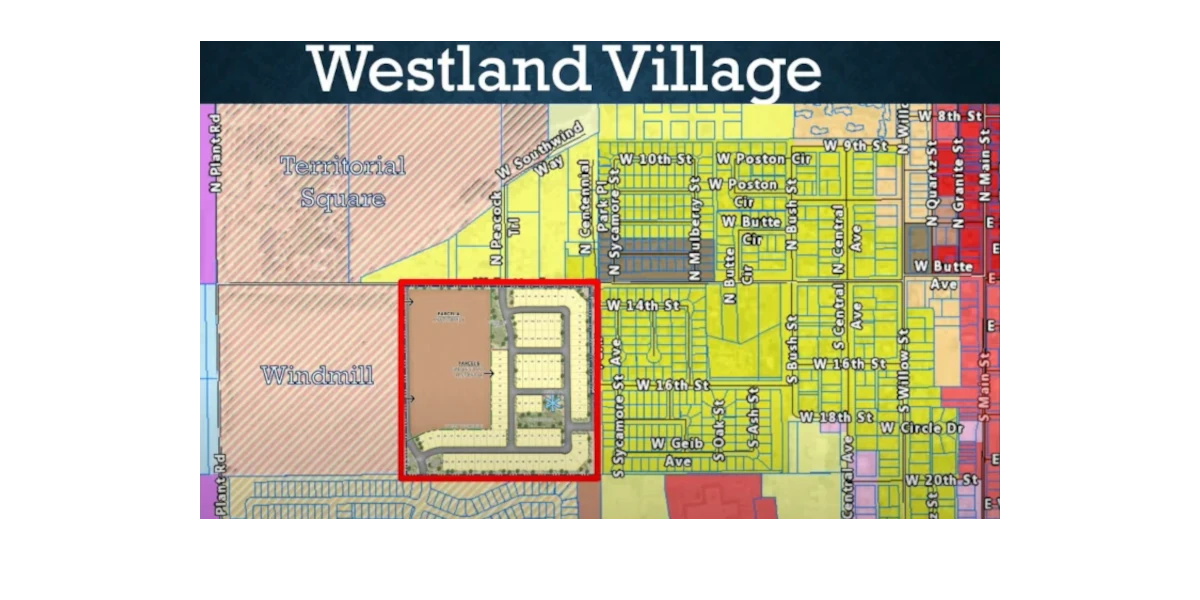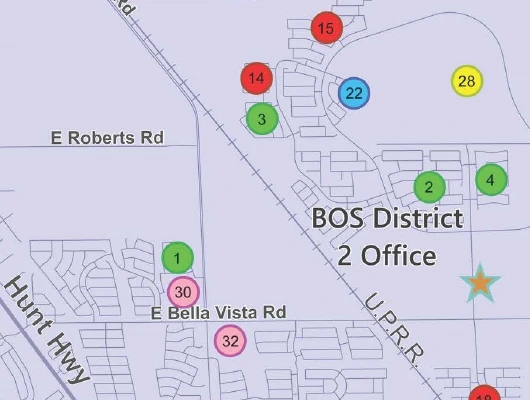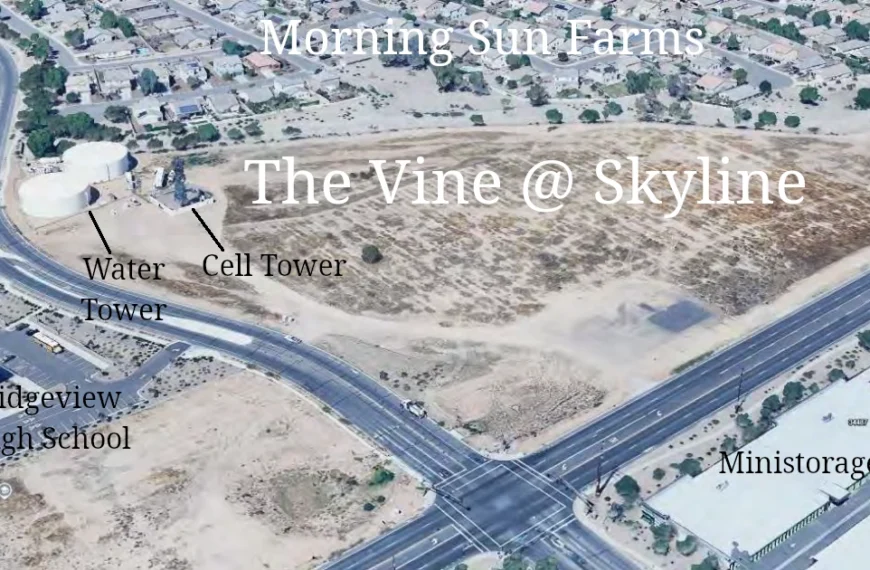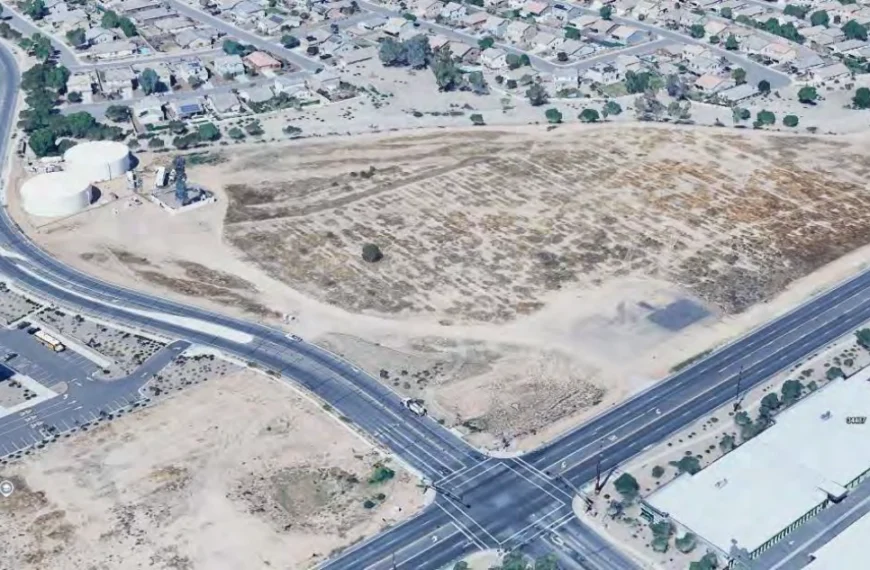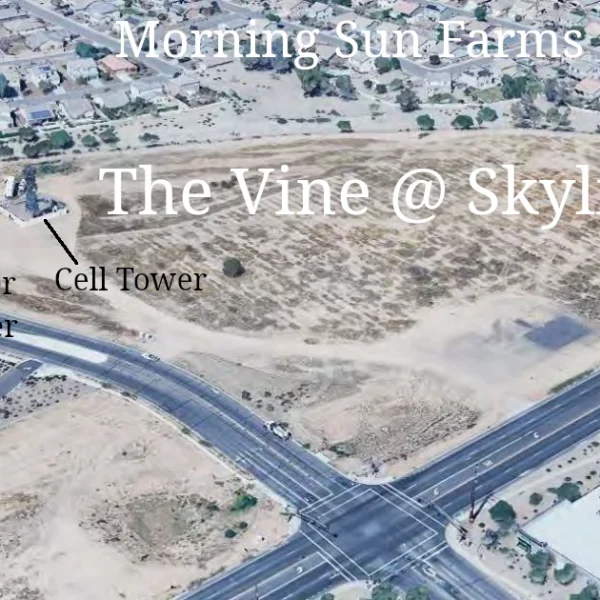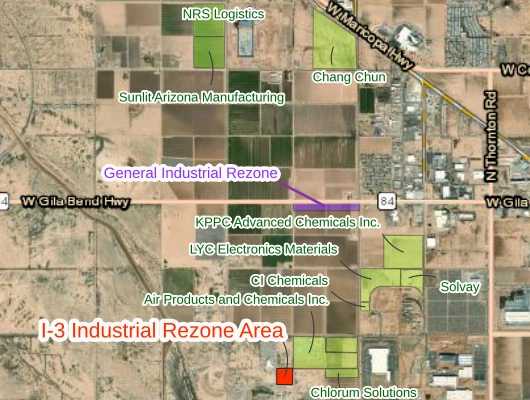The Florence Town Council unanimously rejected the proposed Westland Village development at their meeting on April 1, 2025. The vote denied Ordinance No. 755-25, which would have approved rezoning approximately 40 acres at the southwest corner of Butte Avenue and Centennial Park Avenue from Rural Agricultural (RA-10) to Planned Unit Development (PUD).
The proposed development faced opposition from neighboring property owners, including Harold Christ, owner of the Windmill Winery, who submitted a letter to the council expressing concerns about traffic and integration with surrounding properties. The Council voiced apprehension about creating new “vested rights” that might bind future councils to decisions made today, reflecting lessons learned from older development agreements. Multiple council members also expressed concerns that the proposed density and multi-family component could potentially harm the successful Windmill Winery business, which has become a cornerstone attraction in Florence.
Development Plan Details
The Westland Village project, presented by Greg Davis of iPlan Consulting representing the property owner, would have transformed the currently vacant 40-acre parcel into a residential community featuring both single-family and multi-family components.
The development planned to include:
- 112 single-family lots on 25.42 acres
- Up to 158 multi-family units on 13.22 acres
- A minimum of 8 acres of community open space (20% of the net site)
- Maximum overall density of 7.0 dwelling units per acre on the 38.64 gross acres
The single-family lots would have been at least 45 feet wide and 115 feet deep, with fenced private yards and two-car garages. The multi-family portion proposed a density range of 6 to 12 units per acre with a two-story height limitation and maximum height of 35 feet.
Davis emphasized during his presentation that the multi-family portion offered a range of intensities and different lifestyles currently unavailable in Florence. He noted, “We have a range of intensities different lifestyles a product that’s really not available in the town right now.” Davis explained that the PUD designation was chosen to provide flexibility for future development needs while still setting parameters on what could be built, noting they “promise it won’t go above 12 units per acre.”
Project Review
The Westland Village proposal underwent review by the Technical Advisory Committee and the Planning and Zoning Commission, which voted 3-1 to forward a recommendation of approval with stipulations to the Town Council. Had the PUD been approved, the developer would have needed to submit a more detailed Final PUD document for Town Council approval before proceeding to preliminary and final plat stages.
The development team made significant changes to their plan during the review process. Initially, Bisbee Road was designed to go through the development, but after Technical Advisory Committee feedback, the developers redesigned it to go around the edge of the neighborhood. This change addressed concerns about having houses fronting directly on what functioned as a collector street.
Council Concerns and Opposition
During the April 1 meeting, council members raised several significant concerns about the proposed development:
Undefined Multi-Family Component
Councilmember Tony Bencina expressed discomfort with the open-ended nature of the multi-family portion, stating: “I personally don’t like leaving a PUD open to be decided some years down the road whether we’re going to put up for sale or we’re going to rent.” He added, “I’m not willing to put it on the line 15 years down the road that some council is going to get stuck with whatever we agree with today.”
Impact on Windmill Winery
Multiple council members worried about potential negative impacts on the Windmill Winery, an established local business owned by Harold Christ, who also owns the 40-acre parcel west of the proposed development. Christ’s property is part of the Territorial Square area, which has been master-planned for a boutique hotel and resort-style casitas.
Councilmember Arthur Neal stated: “We have a very successful business there, the Windmill Winery, and I just don’t want to see apartment buildings over there… Windmill Winery has done a lot for Florence and it’s been there for a while.”
Councilmember Jose Maldonado echoed this sentiment: “As the liaison for the chamber of commerce, my job is to look out for businesses… and one thing is that we don’t want to hurt a business.”
Density Concerns
Several council members questioned whether the proposed density fit the character of the area. Councilmember Nicole Buccellato stated: “I have an acre here in town that my home sits on and I just can’t imagine 12 units on one acre – very saturated. And I don’t feel that that fits the area either.”
Vice Mayor Cathy Adam noted that the property is currently zoned RA-10, which would allow for approximately four ranchettes on the entire property. “We’re going from four to 158 and 112,” she said, referencing the substantial increase in density.
Traffic Worries
Vice Mayor Cathy Adam expressed concern about traffic despite the favorable traffic study, particularly noting the impact of events at the Windmill Winery: “Harold Christ has built a tremendous business for the town of Florence… his vendor spring and fall vendor events have a huge amount of traffic.” She added, “In the eyes of the traffic study, we may be a B. In the eyes of the residents, we’re already at a C minus and adding more is causing quite a bit of consternation to all of our residents.”
Historic Character and Amenities
Vice Mayor Cathy Adam questioned whether the development would align with the historic character that influenced the nearby Territorial Square project: “Territorial Square was very, very much built with the intention of blending historic Florence with the new developments.” She noted that while the Windmill Winery is a commercial establishment, it has “a very down home historic feel” with its brickyard and farm implements.
Councilmember Bencina also raised concerns about the lack of detailed plans for community amenities, stating: “I look at your housing and you say amenities but we have nothing to show when you show open space… what amenities are you putting in there for the kids to play with?”
Learning from Past Development Agreements
The Westland Village discussion reflects Florence’s experience with previous development agreements, most notably the ongoing issues with the Anthem at Merrill Ranch East development. On March 20, 2025, the Florence Planning and Zoning Commission rejected Pulte Group’s preliminary plat for that development in a 3-2 vote, highlighting tensions between decades-old development agreements and current community concerns.
In the Anthem East case, Town Attorney Clifford Mattice repeatedly emphasized the commission’s limited authority due to “vested rights” granted to developers through agreements made nearly two decades ago. Planning Commission Chairman Lonnie Frost acknowledged this reality, noting: “We’ve learned that when the town council 20 years ago made this deal, they gave them legal vested rights, and so in a lot of ways our hands are tied.”
Councilmember Bencina’s concerns about Westland Village suggest the council has become wary of creating new situations where future town leaders might find themselves constrained by development decisions made in 2025. His explicit worry about what future councils might be “stuck with” shows how the Anthem East experience may be influencing current development decisions.
Future Possibilities
Despite the unanimous rejection, with all seven council members voting against the proposal, Mayor Keith Eaton offered encouraging words to the development team at the conclusion of the vote: “Thank you once again for the presentation. There is hope – do not go away, there’s hope. So bring back what you’ve heard tonight and we look forward to seeing you again.”
This suggests the door remains open for the developer to return with a revised proposal that addresses the council’s concerns, particularly related to density, character, impact on neighboring businesses, and specific amenities.
The outcome of this vote demonstrates Florence’s careful approach to new development as the town continues to balance growth with preserving its unique character and supporting established local businesses.
